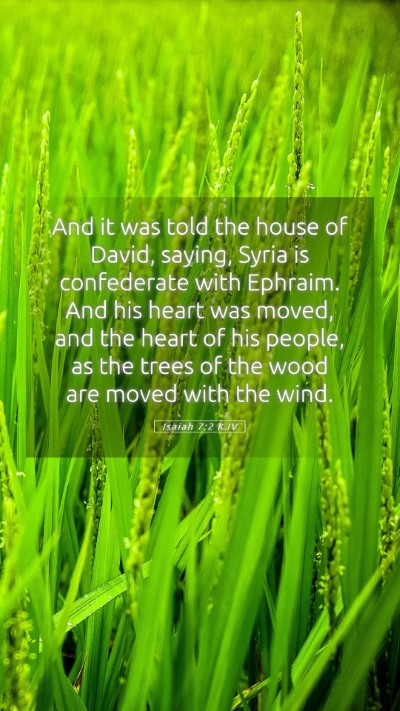Understanding Isaiah 7:2
Isaiah 7:2 states, "And it was told the house of David, saying, ‘Syria is confederate with Ephraim.’ And his heart was moved, and the heart of his people, as the trees of the wood are moved with the wind."
This verse highlights a critical moment in the history of Israel during King Ahaz's reign. The political landscape was tumultuous, with confederacies forming against Judah, and the fear gripping the hearts of its leaders and citizens.
Bible Verse Commentary
Contextual Background:
To fully grasp the meaning of this Bible verse, one must consider the historical and political context in which Isaiah prophesied. At this time, the kingdom of Judah was threatened by the alliance of Ephraim (the northern kingdom of Israel) and Syria, seeking to overthrow Ahaz and impose a puppet king.
Insights from Commentaries
- Matthew Henry: Henry emphasizes the significance of the “house of David” in the context of God’s covenant and the Davidic lineage. He notes the deep fear that gripped King Ahaz, likening it to the natural, fearful reactions we see in life. His heart and the hearts of his people were as unsettled as trees swayed by a tempest, showcasing a response of fear coupled with a lack of faith in God’s promises.
- Albert Barnes: Barnes points to the specific mention of the “house of David,” noting that this reference to Judah underlines the importance of the Davidic line, which plays a crucial role in messianic prophecy. He interprets the "confederate" as a significant threat, warning that the fear elicited was not merely political but a spiritual indicator of trust and reliance on God in times of distress.
- Adam Clarke: Clarke elaborates on the emotional response of the leaders in Judah. He explains the imagery of trees being shaken by the wind as symbolic of instability and fear, stressing how these reactions demonstrate a wavering trust in God's sovereignty. Clarke suggests that this represents a vital turning point where God's intervention is necessary to consolidate faith and trust among His people.
Theological Implications
The verse serves as a poignant reminder of the importance of faith in turbulent times. The anxiety of King Ahaz can be seen as a reflection of human nature when faced with threats. The scripture analysis here encourages believers to trust in divine providence, especially when circumstances appear dire.
Application in Daily Life
Today's believers can take comfort in the fact that God is sovereign over all kingdoms and affairs. Just as the message was relayed to Ahaz to bring him hope, so too can we receive assurance through scripture. When faced with challenges, this Bible verse explanation encourages us to remain steadfast, acknowledging that God can turn even the most dire situations for good.
Related Cross References
- Isaiah 8:12-14: God advises against fearing what others fear, emphasizing His role as a sanctuary.
- 2 Kings 16:5-9: Provides historical context regarding King Ahaz's decisions during the siege.
- Isaiah 9:6-7: Prophecies of the coming Messiah, further emphasizing the importance of the house of David.
Conclusion
Isaiah 7:2 encapsulates both a historical moment of strife and a timeless message about faith. Understanding this verse goes beyond mere historical analysis; it encourages personal application and reassures believers of God’s overarching authority in their lives. As we study this scripture, we are reminded of the divine promise that still holds true today: trust in God over fear as the ultimate source of strength in uncertain times.


